新概念第一册笔记整理
- 格式:doc
- 大小:802.00 KB
- 文档页数:79
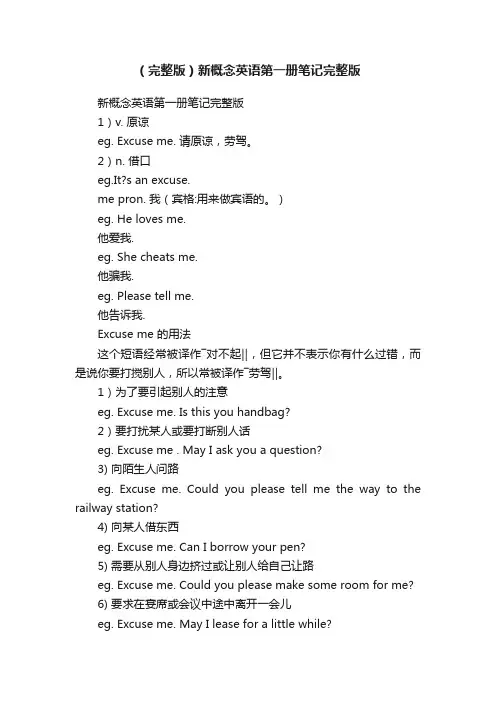
(完整版)新概念英语第一册笔记完整版新概念英语第一册笔记完整版1)v. 原谅eg. Excuse me. 请原谅,劳驾。
2)n. 借口eg.It?s an excuse.me pron. 我(宾格:用来做宾语的。
)eg. He loves me.他爱我.eg. She cheats me.他骗我.eg. Please tell me.他告诉我.Excuse me 的用法这个短语经常被译作―对不起‖,但它并不表示你有什么过错,而是说你要打搅别人,所以常被译作―劳驾‖。
1)为了要引起别人的注意eg. Excuse me. Is this you handbag?2)要打扰某人或要打断别人话eg. Excuse me . May I ask you a question?3) 向陌生人问路eg. Excuse me. Could you please tell me the way to the railway station?4) 向某人借东西eg. Excuse me. Can I borrow your pen?5) 需要从别人身边挤过或让别人给自己让路eg. Excuse me. Could you please make some room for me?6) 要求在宴席或会议中途中离开一会儿eg. Excuse me. May I lease for a little while?sorry 用于当你做错事而向别人道歉的时候,表示―对不起‖。
1)请问几点了?eg. Excuse me. What time is it?2) 不小心把水弄到了别人的身上。
eg. Sorry. 或者I?m sorry!3) 对不起,我先失陪一下eg. Excuse me.4) 误解了别人的意思?eg. Sorry. ?yes1) adv. 是的(对一般疑问句的肯定回答)eg. Are you mad? --Yes, I am.2)经常用于应答,表示―什么事‖。

新概念第一册笔记整理宝子们!今天咱来整理下新概念第一册的笔记哈。
这可是英语学习的经典教材呢,咱得好好琢磨琢磨。
一、语法知识要点。
咱这新概念第一册里的语法知识那可不少哈。
比如说一般现在时,它经常用来表示习惯性的动作或者客观存在的事实。
像“I get up at six o'clock every day.”这里就是用一般现在时描述每天起床这个习惯性动作。
咱得记住它的构成,一般情况下,主语是第三人称单数的时候,动词要加“s”或者“es”哦,要是其他人称,动词就用原形。
还有现在进行时,它表示正在进行的动作。
比如说“Look! She is reading a book.”这里就是强调她正在看书这个动作呢。
它的构成是be动词(am/is/are)加上动词的ing形式。
咱在写句子的时候,可别把这个结构给弄错啦。
二、词汇积累。
这册书里的词汇也很重要哈。
像“apple”,读音是英 [ˈæpl] 美 [ˈæpl] ,意思就是“苹果”。
咱可以造个句子,“I like eating apples.”表示“我喜欢吃苹果”。
再比如说“pen”,读音英 [pen] 美 [pen] ,意思是“钢笔”。
句子可以是“She has a beautiful pen.”就是“她有一支漂亮的钢笔”。
还有“car”,读音英 [kɑː(r)] 美 [kɑːr] ,意思是“汽车”。
像“My father drives a car to work.”就是“我爸爸开车去上班”。
三、课文重点内容。
课文里有很多经典的对话和句子哈。
比如说第一课里的“How are you?”回答一般是“I'm fine, thank you. And you?”这就是很日常的打招呼用语呀,咱在生活中要是碰到外国人,也可以用这个来打招呼呢。
再比如说关于购物的那部分课文,里面有很多关于询问价格、数量之类的句子。
像“How much is this?”就是问这个东西多少钱。
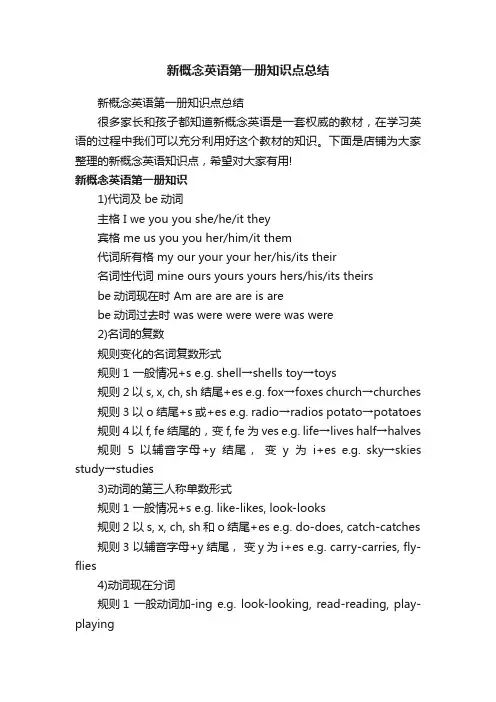
新概念英语第一册知识点总结新概念英语第一册知识点总结很多家长和孩子都知道新概念英语是一套权威的教材,在学习英语的过程中我们可以充分利用好这个教材的知识。
下面是店铺为大家整理的新概念英语知识点,希望对大家有用!新概念英语第一册知识1)代词及be动词主格 I we you you she/he/it they宾格 me us you you her/him/it them代词所有格 my our your your her/his/its their名词性代词 mine ours yours yours hers/his/its theirsbe动词现在时 Am are are are is arebe动词过去时 was were were were was were2)名词的复数规则变化的名词复数形式规则1 一般情况+s e.g. shell→shells toy→toys规则2 以s, x, ch, sh结尾+es e.g. fox→foxes church→churches 规则3 以o结尾+s或+es e.g. radio→radios potato→potatoes 规则4 以f, fe结尾的,变f, fe为ves e.g. life→lives half→halves 规则5 以辅音字母+y结尾,变y为i+es e.g. sky→skies study→studies3)动词的第三人称单数形式规则1 一般情况+s e.g. like-likes, look-looks规则2 以s, x, ch, sh和o结尾+es e.g. do-does, catch-catches 规则3 以辅音字母+y结尾,变y为i+es e.g. carry-carries, fly-flies4)动词现在分词规则1 一般动词加-ing e.g. look-looking, read-reading, play-playing规则2 以不发音的字母结尾的单词去e加-ing e.g. make-making, take-taking, arrive-arriving规则3 重读闭音节词结尾,即单词中只有一个元音字母,其后紧跟一个辅音字母的词,双写辅音字母再加-ing e. g. run-running, sit-sitting, get-getting, swim-swimming, stop-stopping5)动词过去式规则动词变化规则1 一般动词加-ed e.g. look-looked, watch-watched, play-played规则2 以e结尾的加-d e.g. make-maked, arrive-arrived规则3 以辅音字母y结尾的变y为i加-ed cry-cried, carry-carried 规则4 重读闭音节词结尾,即单词中只有一个元音字母,其后紧跟一个辅音字母的词,双写辅音字母再加-ed stop-stopped 过去式的读音在清辅音后面(除外)读/t/ e.g. walked, jumped在浊辅音和元音后读/d/ e.g. washed, watched在/t/,/d/后读/id/ e.g. waited, hated新概念英语基础知识点1.in+语言/颜色/衣帽等,表示使用某种语言或穿着……。
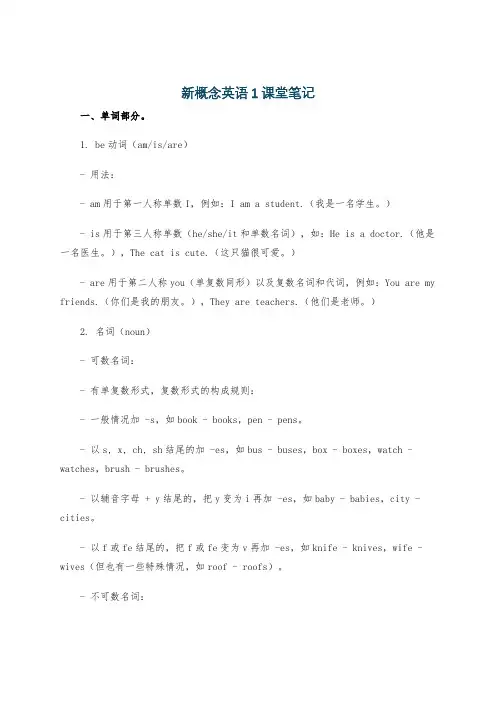
新概念英语1课堂笔记一、单词部分。
1. be动词(am/is/are)- 用法:- am用于第一人称单数I,例如:I am a student.(我是一名学生。
)- is用于第三人称单数(he/she/it和单数名词),如:He is a doctor.(他是一名医生。
),The cat is cute.(这只猫很可爱。
)- are用于第二人称you(单复数同形)以及复数名词和代词,例如:You are my friends.(你们是我的朋友。
),They are teachers.(他们是老师。
)2. 名词(noun)- 可数名词:- 有单复数形式,复数形式的构成规则:- 一般情况加 -s,如book - books,pen - pens。
- 以s, x, ch, sh结尾的加 -es,如bus - buses,box - boxes,watch - watches,brush - brushes。
- 以辅音字母 + y结尾的,把y变为i再加 -es,如baby - babies,city - cities。
- 以f或fe结尾的,把f或fe变为v再加 -es,如knife - knives,wife - wives(但也有一些特殊情况,如roof - roofs)。
- 不可数名词:- 没有复数形式,例如water(水),milk(牛奶),bread(面包)等。
在表示数量时,要用相应的量词词组,如a glass of water(一杯水),a piece of bread (一片面包)。
3. 形容词(adjective)- 用法:用来修饰名词,说明事物或人的特征。
例如:a beautiful flower(一朵美丽的花朵),a tall boy(一个高个子男孩)。
- 形容词的位置:一般放在名词前面,但在某些结构中也可以后置,如something interesting(一些有趣的东西)。
4. 代词(pronoun)- 人称代词:- 主格:I(我),you(你/你们),he(他),she(她),it(它),we(我们),they(他们/她们/它们)。
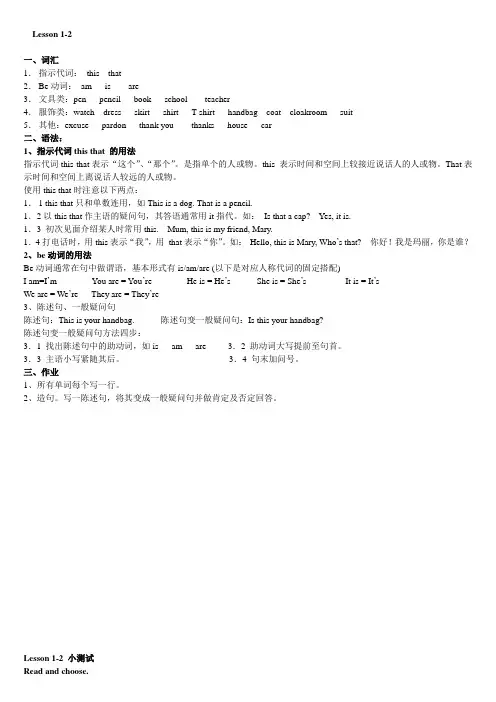
Lesson 1-2一、词汇1.指示代词:this that2.Be动词:am is are3.文具类:pen pencil book school teacher4.服饰类:watch dress skirt shirt T-shirt handbag coat cloakroom suit5.其他:excuse pardon thank you thanks house car二、语法:1、指示代词this that 的用法指示代词this that表示“这个”、“那个”。
是指单个的人或物。
this 表示时间和空间上较接近说话人的人或物。
That表示时间和空间上离说话人较远的人或物。
使用this that时注意以下两点:1.1 this that只和单数连用,如This is a dog. That is a pencil.1.2以this that作主语的疑问句,其答语通常用it指代。
如:Is that a cap? Yes, it is.1.3 初次见面介绍某人时常用this. Mum, this is my friend, Mary.1.4打电话时,用this表示“我”,用that表示“你”。
如:Hello, this is Mary, Who’s that? 你好!我是玛丽,你是谁?2、be动词的用法Be动词通常在句中做谓语,基本形式有is/am/are (以下是对应人称代词的固定搭配)I am=I’m You are = You’re He is = He’s She is = She’s It is = It’sWe are = We’re They are = They’re3、陈述句、一般疑问句陈述句:This is your handbag. 陈述句变一般疑问句:Is this your handbag?陈述句变一般疑问句方法四步:3.1 找出陈述句中的助动词,如is am are 3.2 助动词大写提前至句首。
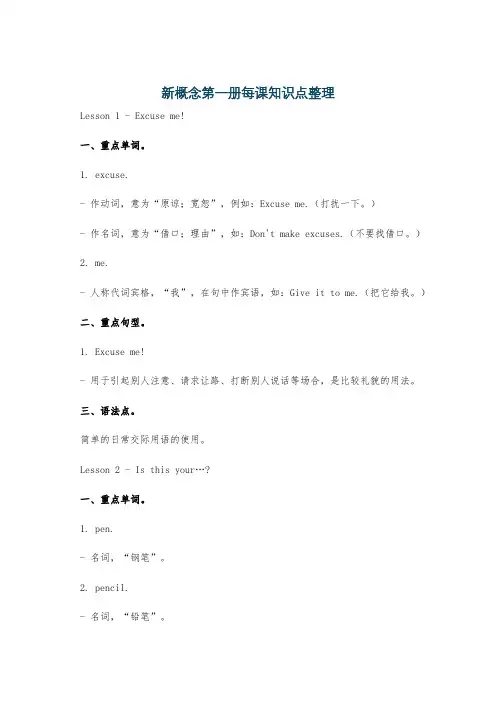
新概念第一册每课知识点整理Lesson 1 - Excuse me!一、重点单词。
1. excuse.- 作动词,意为“原谅;宽恕”,例如:Excuse me.(打扰一下。
)- 作名词,意为“借口;理由”,如:Don't make excuses.(不要找借口。
)2. me.- 人称代词宾格,“我”,在句中作宾语,如:Give it to me.(把它给我。
)二、重点句型。
1. Excuse me!- 用于引起别人注意、请求让路、打断别人说话等场合,是比较礼貌的用法。
三、语法点。
简单的日常交际用语的使用。
Lesson 2 - Is this your…?一、重点单词。
1. pen.- 名词,“钢笔”。
2. pencil.- 名词,“铅笔”。
3. book.- 名词,“书”。
4. watch.- 名词,“手表”;也可作动词,“观看”,如:watch TV(看电视)。
二、重点句型。
1. Is this your pen?- 这是一般疑问句,其结构为“be动词(is/are等)+主语+其他”,回答可以是“Yes, it is.”或者“No, it isn't.”三、语法点。
1. 一般疑问句的构成与回答。
2. 指示代词this的用法,用来指代离说话者较近的人或物。
Lesson 3 - Sorry, sir.一、重点单词。
1. umbrella.- 名词,“雨伞”。
2. please.- 副词,用于请求别人做某事时表示礼貌,如:Please open the window.(请打开窗户。
)二、重点句型。
1. Is this your umbrella?- 同Lesson 2中的一般疑问句结构。
2. Sorry, sir.- “sorry”表示歉意,“sir”是对男性的尊称。
三、语法点。
1. 继续巩固一般疑问句。
2. 尊称“sir”的用法。
Lesson 4 - Is this your…?一、重点单词。
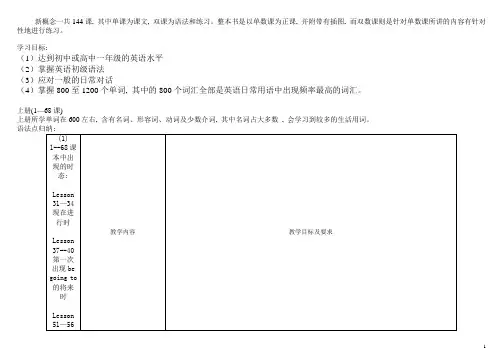
新概念一共144课, 其中单课为课文, 双课为语法和练习。
整本书是以单数课为正课, 并附带有插图, 而双数课则是针对单数课所讲的内容有针对性地进行练习。
学习目标:
(1)达到初中或高中一年级的英语水平
(2)掌握英语初级语法
(3)应对一般的日常对话
(4)掌握800至1200个单词, 其中的800个词汇全部是英语日常用语中出现频率最高的词汇。
上册(1—68课)
上册所学单词在600左右, 含有名词、形容词、动词及少数介词, 其中名词占大多数, 会学习到较多的生活用词。
中册(69—106课), 大约有300单词, 包含名词、动词、形容词、副词、介词, 其中所学的动词和副词会有所增加。
课文中出现的时态有:
Lesson 67—76 为一般过去式
Lesson 83—90 为现在完成时
Lesson 91—96 为一般将来时
下册(107—144课), 大约有300个单词
1、语法点归纳:
2、L107-108形容词的比较级, 最高级
3、L117-118时间状语从句和过去进行时
4、L121-122定语从句
5、L119-120 过去完成时
6、L139-140宾语从句
7、L141-144被动语态。
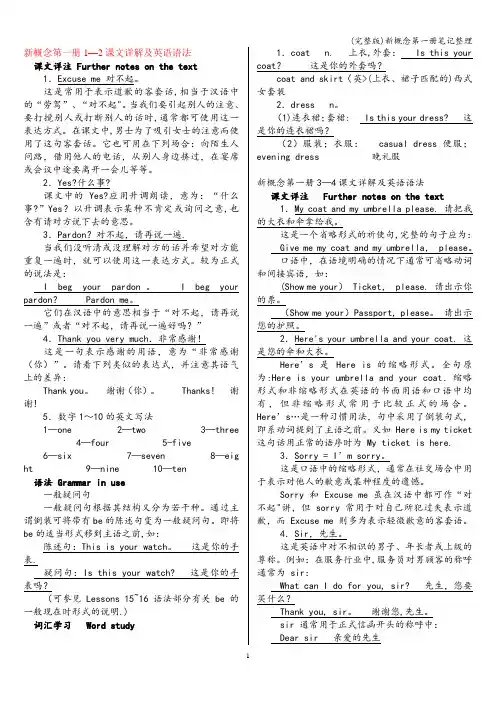
新概念第一册1—2课文详解及英语语法课文详注 Further notes on the text1.Excuse me 对不起。
这是常用于表示道歉的客套话,相当于汉语中的“劳驾”、“对不起"。
当我们要引起别人的注意、要打搅别人或打断别人的话时,通常都可使用这一表达方式。
在课文中,男士为了吸引女士的注意而使用了这句客套话。
它也可用在下列场合:向陌生人问路,借用他人的电话,从别人身边挤过,在宴席或会议中途要离开一会儿等等。
2.Yes?什么事?课文中的 Yes?应用升调朗读,意为:“什么事?”Yes?以升调表示某种不肯定或询问之意,也含有请对方说下去的意思。
3.Pardon?对不起,请再说一遍.当我们没听清或没理解对方的话并希望对方能重复一遍时,就可以使用这一表达方式。
较为正式的说法是:I beg your pardon。
I beg your pardon? Pardon me。
它们在汉语中的意思相当于“对不起,请再说一遍”或者“对不起,请再说一遍好吗?”4.Thank you very much.非常感谢!这是一句表示感谢的用语,意为“非常感谢(你)”。
请看下列类似的表达式,并注意其语气上的差异:Thank you。
谢谢(你)。
Thanks! 谢谢!5.数字1~10的英文写法1—one 2—two 3—three 4—four 5-five6—six 7—seven 8—eig ht 9—nine 10—ten语法 Grammar in use一般疑问句一般疑问句根据其结构又分为若干种。
通过主谓倒装可将带有be的陈述句变为一般疑问句。
即将be的适当形式移到主语之前,如:陈述句:This is your watch。
这是你的手表.疑问句:Is this your watch? 这是你的手表吗?(可参见 Lessons 15~16语法部分有关 be的一般现在时形式的说明.)词汇学习 Word study1.coat n. 上衣,外套: Is this your coat?这是你的外套吗?coat and skirt〈英>(上衣、裙子匹配的)西式女套装2.dress n。
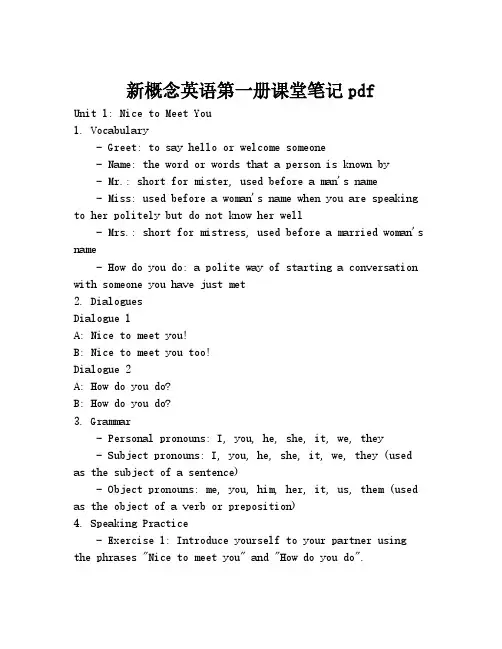
新概念英语第一册课堂笔记pdfUnit 1: Nice to Meet You1. Vocabulary- Greet: to say hello or welcome someone- Name: the word or words that a person is known by- Mr.: short for mister, used before a man's name- Miss: used before a woman's name when you are speaking to her politely but do not know her well- Mrs.: short for mistress, used before a married woman's name- How do you do: a polite way of starting a conversation with someone you have just met2. DialoguesDialogue 1A: Nice to meet you!B: Nice to meet you too!Dialogue 2A: How do you do?B: How do you do?3. Grammar- Personal pronouns: I, you, he, she, it, we, they- Subject pronouns: I, you, he, she, it, we, they (used as the subject of a sentence)- Object pronouns: me, you, him, her, it, us, them (used as the object of a verb or preposition)4. Speaking Practice- Exercise 1: Introduce yourself to your partner using the phrases "Nice to meet you" and "How do you do".- Exercise 2: Practice using the subject pronouns in sentences.Unit 2: What's Your Name?1. Vocabulary- Name: the word or words that a person is known by- Surname: the name that you share with other members of your family; last name- Christian name: the name given to you when you were baptized, especially if you are a Christian- First name: the name that you have from birth, that comes before your family name- Middle name: a name that is between your first name and your family name- Full name: your first name, any middle names, and your family name- Initials: the first letters of each of your names, used as a short way of writing your full name2. DialoguesDialogue 1A: What's your name?B: My name is John Smith.Dialogue 2A: What's your full name?B: My full name is Mary Jane Johnson.3. Grammar- Interrogative pronouns: what, which, who, whom, whose - Wh-questions: questions that begin with "wh-" words and expect information as an answer4. Speaking Practice- Exercise 1: Ask your partner for their full name using the question "What's your full name?"- Exercise 2: Practice asking and answering questions with different interrogative pronouns.Unit 3: Where are You From?1. Vocabulary- Nationality: the legal relationship between a person and a country- Country: an area of land that has its own government, army, etc- City: a large and important town- Town: a place where people live and work, that is smaller than a city- Village: the smallest type of town where people live in the countryside- Capital: the most important city in a country, where the government is based2. DialoguesDialogue 1A: Where are you from?B: I'm from China.Dialogue 2A: What's your nationality?B: I'm French.3. Grammar- Verb to be: am, is, are- Present simple: the form of a verb used to describe actions that regularly happen or facts that are always true 4. Speaking Practice- Exercise 1: Ask your partner where they are from using the question "Where are you from?"- Exercise 2: Practice using the verb "to be" in sentences about nationality and origin.(Note: The content above is a sample and does not fully cover the entire document "新概念英语第一册课堂笔记pdf".)。
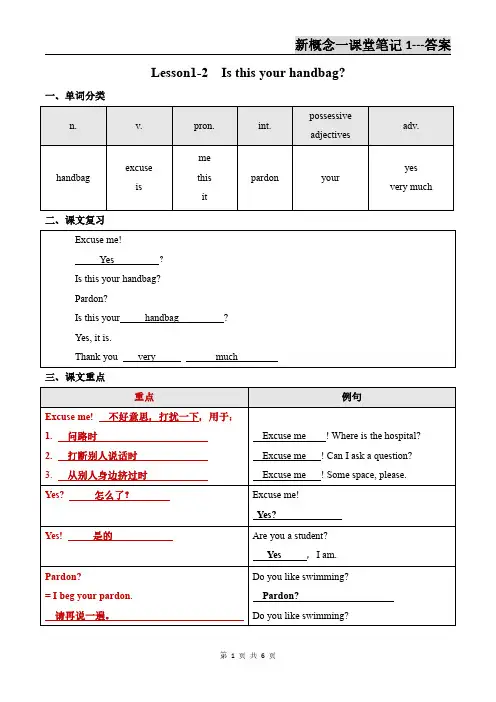
Lesson1-2Is this your handbag?一、单词分类二、课文复习Excuse me!Yes?Is this your handbag?Pardon?Is this your handbag?Yes,it is.Thank you very much三、课文重点Thank you very much.=Thanks a lot.Thank you verymuch.You’re welcome./That’s all right.Thanks a lot.四、语法解析1.主格放在句首,作主语宾格放在动词或介词后,作宾语1.I love my mother.She loves me.(I)2.We are family.(we)3.Look at them.They are listening to the teacher carefully.(they)4.Are you(you)Mr.Zhang?5.Mary is waiting for him(he).形物代后跟名词,不能单独存在1.Is this your house?(you)2.I do my homework every day.(I)3.Sally is here.That is her car.(she)4.What is your name?(you)5.Look at my(I)dress.Is it beautiful?名物代用于替代前面提到的名词,后面不再跟名词1.Whose pen is it?It’s his(he).2.My cup is red and yours(you)is blue.3.Is this your handbag?Yes,it’s mine.4.Is that your key?No,it isn’t.It’s hers(she).5.That is not my bike.Mine is new.(I)2.陈述句变一般疑问句--变化规则:1.找到be动词,大写提句首2.人称做变化:my—your,our—your3.其它部分照抄4.句号变问号练习:This is his pen.变一般疑问句Is this his pen?This is her pencil.变一般疑问句Is this her pencil?This is their car.变一般疑问句Is this their car?This is its book.变一般疑问句Is this its book?This is your car.变一般疑问句Is this your car?This is my dog.变一般疑问句Is this your dog?This is our dog.变一般疑问句Is this your dog?五、单词练习1.There is that,here is t his.2.Thanks means(意思是)t hank you.3.Thanks a lot means thank you v ery much.4.A boy,he;a girl,she;a dog,i t.5.You are my friend,I am y our friend.6.When you want to sneeze(打喷嚏),you should(应该)say excuse me.。
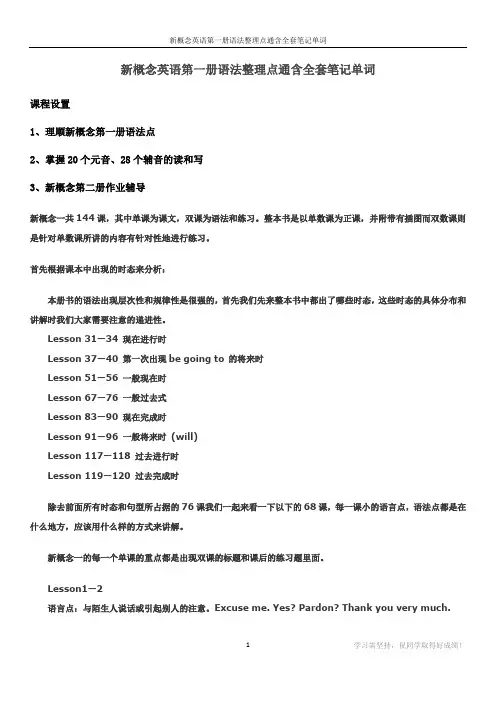
新概念英语第一册语法整理点通含全套笔记单词课程设置1、理顺新概念第一册语法点2、掌握20个元音、28个辅音的读和写3、新概念第二册作业辅导新概念一共144课,其中单课为课文,双课为语法和练习。
整本书是以单数课为正课,并附带有插图而双数课则是针对单数课所讲的内容有针对性地进行练习。
首先根据课本中出现的时态来分析:本册书的语法出现层次性和规律性是很强的,首先我们先来整本书中都出了哪些时态,这些时态的具体分布和讲解时我们大家需要注意的递进性。
Lesson 31—34 现在进行时Lesson 37—40 第一次出现be going to 的将来时Lesson 51—56 一般现在时Lesson 67—76 一般过去式Lesson 83—90 现在完成时Lesson 91—96 一般将来时(will)Lesson 117—118 过去进行时Lesson 119—120 过去完成时除去前面所有时态和句型所占据的76课我们一起来看一下以下的68课,每一课小的语言点,语法点都是在什么地方,应该用什么样的方式来讲解。
新概念一的每一个单课的重点都是出现双课的标题和课后的练习题里面。
Lesson1—2语言点:与陌生人说话或引起别人的注意。
Excuse me. Yes? Pardon? Thank you very much.语法点:主系表结构this为主语,名词做表语1的一般疑问句以及它的肯定回答。
Is this your handbag? Yes, it is.Lesson 5—6语言点:如何介绍别人。
This is Miss Sophie Dupont. Nice to meet you.语法点:主语为第三人称单数的主系表结构。
She is French. He is German. It’s a Volvo.(L6) a/an 的使用。
Lesson 7—8语言点:如何自我介绍和相互认识。
语法点:主语为第二人称的主系表结构。
新概念英语第一册笔记Lesson 1 Excuse meexcuse v. 原谅me pron. 我(宾格)yes adv. 是的is v. be动词现在时第三人称单数this pron. 这your possessive adjective 你的,你们的handbag n.(女用)手提包pardon int. 原谅,请再说一遍it pron. 它thank you 感谢你(们)very much 非常地★Excuse me.1、引起对方注意时2、常用于与陌生人搭话,打断别人的说话或从别人身边挤过,或在某个聚会中突然中途要离开一会儿时Excuse us for a moment. 对不起,让我们单独聊会。
sorry 对不起,用于对别人有伤害时★me pron. 我(宾格)人称代词:主格:用在句首,作主语宾格:在动词、介词之后形容词性的物主代词:不能单独使用名词性物主代词:只能单独使用★is v. be动词现在时第三人称单数be动词:am、is、areI amshe/ he/ it isyou/ we/ they are★pardon int. 原谅,请再说一遍Pardon?/ I beg your pardon. 请求对方把刚才讲过的话重复一遍。
[语法]含有be动词的陈述句、否定句和一般疑问句含有be动词的任何句子,否定句就是在be动词后面加not;如果变一般疑问句,就把be动词提前到句子的前面。
[课文]Excuse me.Yes?Is this your handbag?Pardon?Is this your handbag?Yes, it is.Thank you very much.Lesson 2 Is this your…?[词汇](10)pen n.钢笔pencil n.铅笔book n.书watch n.手表coat n.上衣,外衣dress n.连衣裙skirt n.裙子shirt n.衬衣car n.小汽车house n.房子★dress① n. 连衣裙;套裙②n. 服装,衣服casual dress 便服evening dress 晚礼服★house n.房子house 房子,一般指独立的院落,更具体的指房子的建筑,结构family 侧重家庭的成员There are four people in my family. 在我家里有四口人。
新概念1知识点归纳总结### 一、语言基础- 词汇量:掌握基础词汇,包括日常用语、常见名词、动词、形容词等。
- 语法结构:了解基本的语法规则,如主谓宾结构、时态变化等。
### 二、句子构建- 简单句:学会构建简单句,表达清晰的意思。
- 并列句:使用并列连词连接两个或多个简单句。
### 三、时态与语态- 一般现在时:表示经常发生的动作或状态。
- 一般过去时:描述过去发生的动作或状态。
- 进行时态:表示正在进行的动作。
### 四、疑问句和否定句- 一般疑问句:通过疑问词引导,询问信息。
- 特殊疑问句:使用特殊疑问词,询问具体细节。
- 否定句:表达否定意义,使用否定词。
### 五、直接引语与间接引语- 直接引语:直接引用别人的原话。
- 间接引语:转述别人的话,使用不同的语法结构。
### 六、条件句- 真实条件句:表达真实可能发生的情况。
- 非真实条件句:表达与现实相反的假设情况。
### 七、非谓语动词- 动名词:动词+ing形式,用作名词。
- 不定式:to+动词原形,表示目的或意图。
- 分词:现在分词(-ing形式)和过去分词(-ed形式),用作形容词。
### 八、定语从句- 限制性定语从句:对先行词进行限定。
- 非限制性定语从句:对先行词进行补充说明。
### 九、状语从句- 时间状语从句:表示动作发生的时间。
- 原因状语从句:说明动作发生的原因。
- 条件状语从句:表示动作发生的条件。
### 十、虚拟语气- 对现在情况的虚拟:表示与现实相反的愿望或假设。
- 对过去情况的虚拟:表示对过去的遗憾或假设。
### 十一、文章结构- 引言:文章开头,提出主题。
- 主体:详细阐述主题,提供论据。
- 结论:文章结尾,总结全文。
### 十二、写作技巧- 段落结构:每个段落包含主题句和支持句。
- 逻辑连接:使用逻辑连接词使文章更加连贯。
通过对新概念1的知识点进行归纳总结,可以更好地掌握英语基础,为进一步学习打下坚实的基础。
新概念英语第一册111课笔记一、词汇。
1. model.- n. 型号;样式;模范;模特儿。
- 例如:This is the latest model of the car.(这是这款汽车的最新型号。
)- She is a fashion model.(她是一名时装模特儿。
)2. afford.- v. 付得起(钱);承担得起(后果);提供。
- 通常用于否定句和疑问句中,常与can, could, be able to连用。
- 例如:I can't afford this expensive watch.(我买不起这块昂贵的手表。
)- We can't afford to make any mistakes.(我们承担不起犯任何错误的后果。
)3. deposit.- n. 定金;存款;沉积物。
- 例如:You need to pay a deposit of 100 dollars.(你需要付100美元的定金。
)- He has a large deposit in the bank.(他在银行有一大笔存款。
)- v. 付(定金);使沉积。
- 例如:I deposited 500 yuan on this apartment.(我为这套公寓付了500元定金。
)- The river deposits a lot of sand at its mouth.(这条河在河口沉积了大量的沙子。
)4. installment.- n. 分期付款;(分期连载的)部分。
- 例如:I bought this TV on installments.(我用分期付款的方式买了这台电视。
)- The story is published in installments.(这个故事分期连载。
)5. price.- n. 价格;代价。
- 例如:The price of this book is 20 yuan.(这本书的价格是20元。
新概念英语第一册知识点总结一、词汇方面。
1. 基础词汇积累。
- 包含日常生活中的各类常见名词,如“pen(钢笔)”“book(书)”“desk (书桌)”“chair(椅子)”等。
这些词汇是描述周围环境和物品的基本元素。
- 人物相关词汇,像“man(男人)”“woman(女人)”“boy(男孩)”“girl (女孩)”“teacher(教师)”“student(学生)”等,有助于构建人物关系的表达。
- 数字词汇“one(一)”“two(二)”“three(三)”……“ten(十)”等,在描述数量、排序等方面是必不可少的。
2. 近义词与反义词。
- 例如“big(大的)”和“small(小的)”是一对反义词,“tall(高的)”与“short(矮的)”也是。
近义词方面,“glad(高兴的)”和“happy(快乐的)”意思相近。
理解近义词和反义词有助于丰富词汇的使用和对比表达。
3. 词汇的复数形式。
- 一般情况直接加 -s,如“books”“pens”。
以s、x、ch、sh结尾的名词加 -es,像“boxes”“watches”。
以辅音字母 + y结尾的名词,把y变为i再加 -es,例如“baby - babies”。
特殊的复数形式如“man - men”“woman - women”“foot - feet”“tooth - teeth”等也需要牢记。
二、语法方面。
1. 一般现在时。
- 用法。
- 表示经常或习惯性的动作或状态。
例如:I get up at six every day.(我每天六点起床。
)- 表示客观事实或真理。
The earth goes around the sun.(地球绕着太阳转。
)- 句子结构。
- 主语为第三人称单数(he/she/it等)时,动词要加 -s或 -es。
如:He likes reading.(他喜欢阅读。
)- 主语为第一人称(I)、第二人称(you)以及复数主语(we/they等)时,动词用原形。
新概念英语笔记第一册新概念英语笔记(第一册)Lesson 37-38Content and Aim 内容和目标一般将来时 (be going to结构) (重难点)Key Words and Expressions 关键词和词组work 工作 hard 努力地 make 做bookcase 书架,书橱 hammer 锤子 paint 上漆,涂pink 粉红色favourite最喜欢的Language Points 语言点You’re working hard, George.working hard 表示“工作的很努力”,这里的”hard”是副词,修饰动词work,有“努力地、费劲地”的意思。
此外,还可以有这样的词组:例:study hard 很努力地学习 play hard 拼命地玩---What are you doing ---I’m making a bookcase.make表示做什么东西,常用的词组还有:make cakes 做蛋糕 make a dress 做一件衣服What are you going to do now, George 现在你打算做什么?这句话表示“打算做什么事”,在英语里用于表示“打算、按计划、准备”说明在最近要做的某事时,用be going to的形式,是一个将来时间的概念。
例如:What are you going to do 你打算做什么?I’m going to cook a meal. 我打算做一餐饭。
What is she going to do 她打算做什么?She’s going to air the room. 她打算给房间通通风。
什么是一般将来时?在英文中表示一个将要发生的动作就是一般将来时,谓语动词则需要用一般将来时。
一般将来时的结构?–->Be动词+going to+动词原形am/is/are +going to+动词原形Will/Shall+动词原形肯定句:主语+be动词+going to+动词原形主语+will/shall+动词原形否定句:主语+be动词+not+going to+动词原形主语+will/shall +not+动词原形(will not=won’t; shall not=shan’t)一般疑问句:be动词+主语+going to+动词原形回答:Yes, 主语 + be/ No, 主语 + be + notWill/Shall+主语+动词原形回答:Yes, 主语 + will/not / No, 主语 + will/shall + not特殊疑问句:What+be动词+主语+going to+动词原形What+will/shall+主语+动词原形例如:I’m going to play basketball. 我打算去打篮球。
新概念第一册1-2、3-4一、一般疑问句1. 定义、可以用Yes或No来回答的问句2. 形式:① Be+主语 +......?eg: Are you a student?②情态动词(Can)+ 主语+ 动词原形+……?eg: Can you speak English?③助动词(Do, Does)+ 主语+ 动词原形+......?eg: Do you like English?3. 口诀:①调:调换句子主语和Be 动词以及情态动词的位置。
(若没有be动词或情态动词,则根据主语的人称助动词,并提至句首)②改:改大小写;把第一人称改第二人称;即:I→you,our→your,my→your,am→are,we→you③把句号改成问号4. 回答:肯定回答:Yes, 主语+ be动词(is,am,are) / can / do(do,does).否定回答:No, 主语+ be动词(is,am,are) / can / do(do,does) + not.5-6二、选择疑问句1. 定义:选择疑问句是指提供两种或多种情况供对方选择的疑问句。
选项之间要用连词“or”来连接。
2. 构成:一般疑问句+ or + 选择部分+?例:Are you a doctor or a teacher? 你是一个医生还是教师?Does he like this or that? 他喜欢这个还是喜欢那个?Is that coffee yours or hers? 这咖啡是你的还是她的?注:有时候选择部分会用“or not”来表示例:Are you ready or not (ready) ? 你准备好没有?Do you like the film or not? 你喜不喜欢这部电影?7-8、11-12、13-14三、特殊疑问句1. 含义:以特殊疑问词开头的疑问句。
2. 构成:特殊疑问词+一般疑问句+?3. 特殊疑问词总结:(1) what 什么(职业,姓名等)what day 星期几What day is it today? 几天星期几?what size 多大尺码What size are your shoes? 你的鞋码多大?what time 什么时间What time is it now? 现在几点了?what colour 什么颜色What color is your schoolbag? 你的书包是什么颜色?(2) when 什么时候(就时间提问)When will you visit Beijing? 你什么时候去北京玩?(3) where 什么地方(就地点提问)Where is your hometown? 你的家乡在哪?(4) who 谁(问人的身份,姓名等)Who is the girl in red dress? 穿着红裙子的女生是谁?(5) whose 谁的(whose + n.)Whose book is this?这是谁的书?(6) which 哪一个;哪些Which one is your sister ? 哪一个是你姐姐?(7) why 为什么(就原因提问,常用because回答)Why did you break the window?你为什么要打破窗户?(8) how 怎么样How do you go to school? 你怎么去学校?how many多少(提问可数名词数量)How many books do you have ?你有几本书?how much 多少(提问不可数名词数量)How much water is there in the glass?玻璃杯里有多少水?how much 多少钱(提问价格)How much is the ruler? 这把尺子多少钱?how old 几岁(提问年龄)How old are you? 你多少岁了?how long 多长(提问长度)How long is this ruler? 这把尺子有多长?多长时间(时间持续多久)How long do you go to school? 你去学校要多长时间?how often 多久一次(提问频率既单位时间发生多少次)how soon (还要多久时间才能开始或结束)How soon will he come back? 他多久才能回来?how heavy(提问有多重)How heavy is the luggage?这个行李箱有多重?9-10四、祈使句1. 定义:用于表达命令、请求、劝告、警告等的句子叫做祈使句。